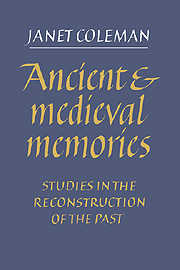Book contents
- Frontmatter
- Contents
- Preface
- List of abbreviations
- PART I THE CRITICAL TEXTS OF ANTIQUITY
- Introduction
- PART II THE PRACTICE OF MEMORY DURING THE PERIOD OF TRANSITION FROM CLASSICAL ANTIQUITY TO THE CHRISTIAN MONASTIC CENTURIES
- Introduction
- 8 The early monastic practice of memory: Gregory the Great; Benedict and his Rule
- 9 Bede, monastic grammatica and reminiscence
- 10 Monastic memory in service of oblivion
- 11 Cistercian ‘blanched’ memory and St Bernard: the associative, textual memory and the purified past
- 12 Twelfth-century Cistercians: the Boethian legacy and the physiological issues in Greco-Arabic medical writings
- PART III THE BEGINNINGS OF THE SCHOLASTIC UNDERSTANDING OF MEMORY
- Introduction
- PART IV ARISTOTLE NEO-PLATONISED: THE REVIVAL OF ARISTOTLE AND THE DEVELOPMENT OF SCHOLASTIC THEORIES OF MEMORY
- Introduction
- PART V LATER MEDIEVAL THEORIES OF MEMORY: THE VIA ANTIQUA AND THE VIA MODERNA.
- Introduction
- Conclusion: an all too brief account of modern theories of mind and remembering
- Bibliography
- Index
10 - Monastic memory in service of oblivion
The ‘Monologion’. On meditation, memory and texts as memoranda
Published online by Cambridge University Press: 06 January 2010
- Frontmatter
- Contents
- Preface
- List of abbreviations
- PART I THE CRITICAL TEXTS OF ANTIQUITY
- Introduction
- PART II THE PRACTICE OF MEMORY DURING THE PERIOD OF TRANSITION FROM CLASSICAL ANTIQUITY TO THE CHRISTIAN MONASTIC CENTURIES
- Introduction
- 8 The early monastic practice of memory: Gregory the Great; Benedict and his Rule
- 9 Bede, monastic grammatica and reminiscence
- 10 Monastic memory in service of oblivion
- 11 Cistercian ‘blanched’ memory and St Bernard: the associative, textual memory and the purified past
- 12 Twelfth-century Cistercians: the Boethian legacy and the physiological issues in Greco-Arabic medical writings
- PART III THE BEGINNINGS OF THE SCHOLASTIC UNDERSTANDING OF MEMORY
- Introduction
- PART IV ARISTOTLE NEO-PLATONISED: THE REVIVAL OF ARISTOTLE AND THE DEVELOPMENT OF SCHOLASTIC THEORIES OF MEMORY
- Introduction
- PART V LATER MEDIEVAL THEORIES OF MEMORY: THE VIA ANTIQUA AND THE VIA MODERNA.
- Introduction
- Conclusion: an all too brief account of modern theories of mind and remembering
- Bibliography
- Index
Summary
INTRODUCTION
The ninth-century monastic revival of the study of ancient grammatical and logical texts in the service of elucidating scriptural meaning and enriching theology, led to the development of a methodology to investigate the meaning of those elements of sacred history held on faith. Events of sacred history, as credibilia, were not to be further investigated to determine whether Scripture recorded such memories accurately. Grammatical and logical studies of the words of Scripture enabled monks to argue coherently about Christian belief and it was words from Scripture, representing the atemporal, exemplary, universal experiences of mankind rather than personal experiences that they were remembering.
From the eleventh century onwards we have texts once again that can be analysed exegetically in order to determine the role of memory in the monastic milieu as members of this milieu drew together some of the threads of the antique memory tradition, especially as these were discussed in the writings of St Augustine. Ancient memory as discussed in texts and medieval memory as exercised in practice were forged together to produce practical discussions like that of St Anselm and St Bernard. They saw themselves as expounding methods by which the practitioner might transcend the memory of sacred text and the memory of lived life, to achieve the forgetfulness of self in the contemplation of God.
- Type
- Chapter
- Information
- Ancient and Medieval MemoriesStudies in the Reconstruction of the Past, pp. 155 - 168Publisher: Cambridge University PressPrint publication year: 1992

